Artificial Intelligence and JD Students
Artificial intelligence (AI) is the ability of machines to perform tasks that normally require human intelligence, such as reasoning, learning, or decision making. AI has been applied to various domains, including law, where it can assist in research, drafting, analysis, or prediction. However, the use of AI in the law is certainly not without controversy, particularly given the high-profile and embarrassing incidents in which lawyers who had not properly vetted their AI bot’s research included AI hallucinations in court filings.
Institutions of higher education are currently grappling with the question of whether artificial intelligence is an essential tool of the future workforce or a means by which students may attempt to bypass their own educational enrichment and critical thinking skill development. We wanted to know how often JD students are currently using AI in their law school coursework. In 2024, LSSSE added the following question:
How often do you use AI (ChatGPT or similar technology) to help prepare for class or complete class assignments, projects, exams, or papers?
- Never
- Sometimes
- Often
- Very often
Our analysis shows that most law students are not currently using AI in their coursework at all. Almost three-quarters (72%) never use AI to prepare for class or complete assignments. A quarter of law students (25%) sometimes use AI in their coursework, and only 4% use it often or very often.
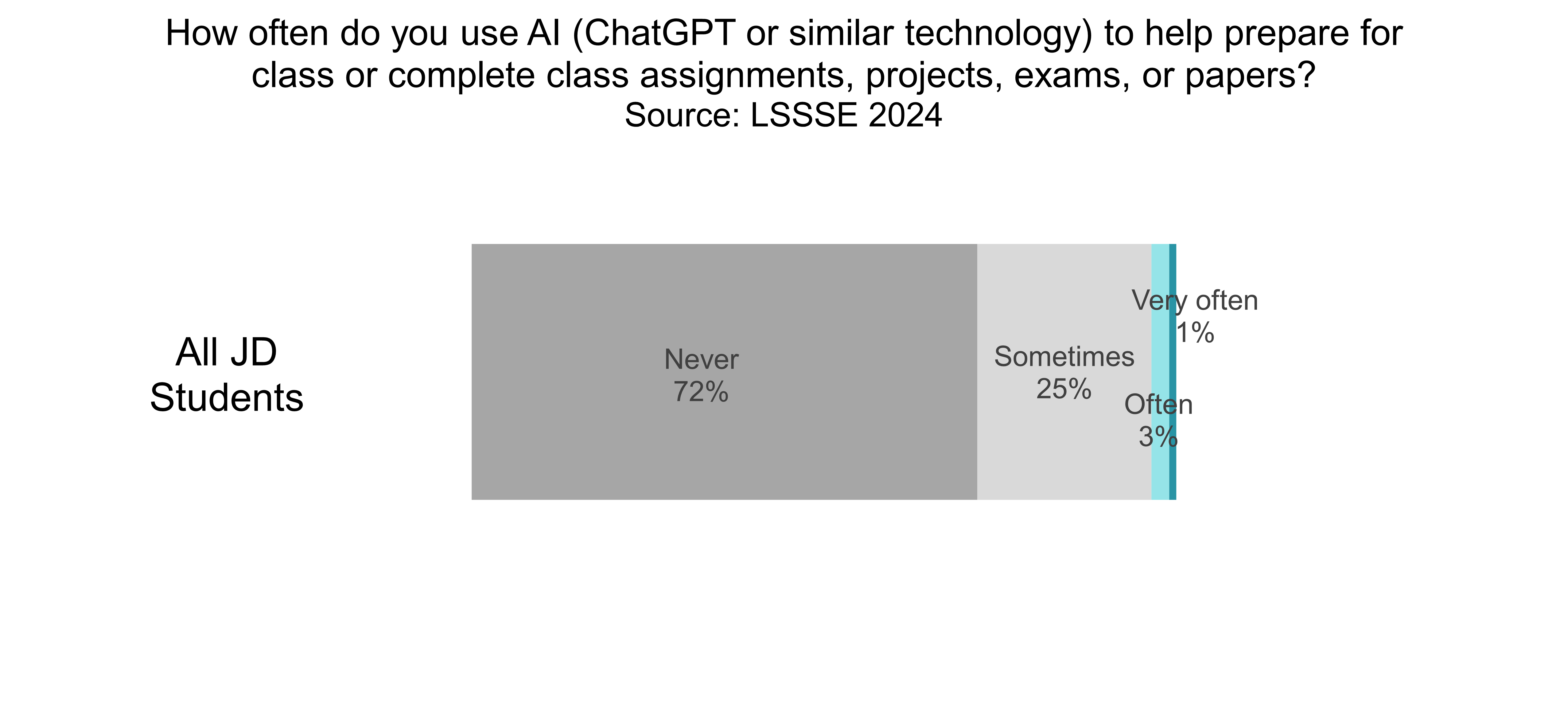
There are only slight generational differences in AI usage, with students in the 23-30 age group a perhaps a tiny bit more likely to use AI than other students. Interestingly, law students who are 22 or younger are the least likely age group to use AI for class preparation or assignments, with only 22% doing so at least sometimes.
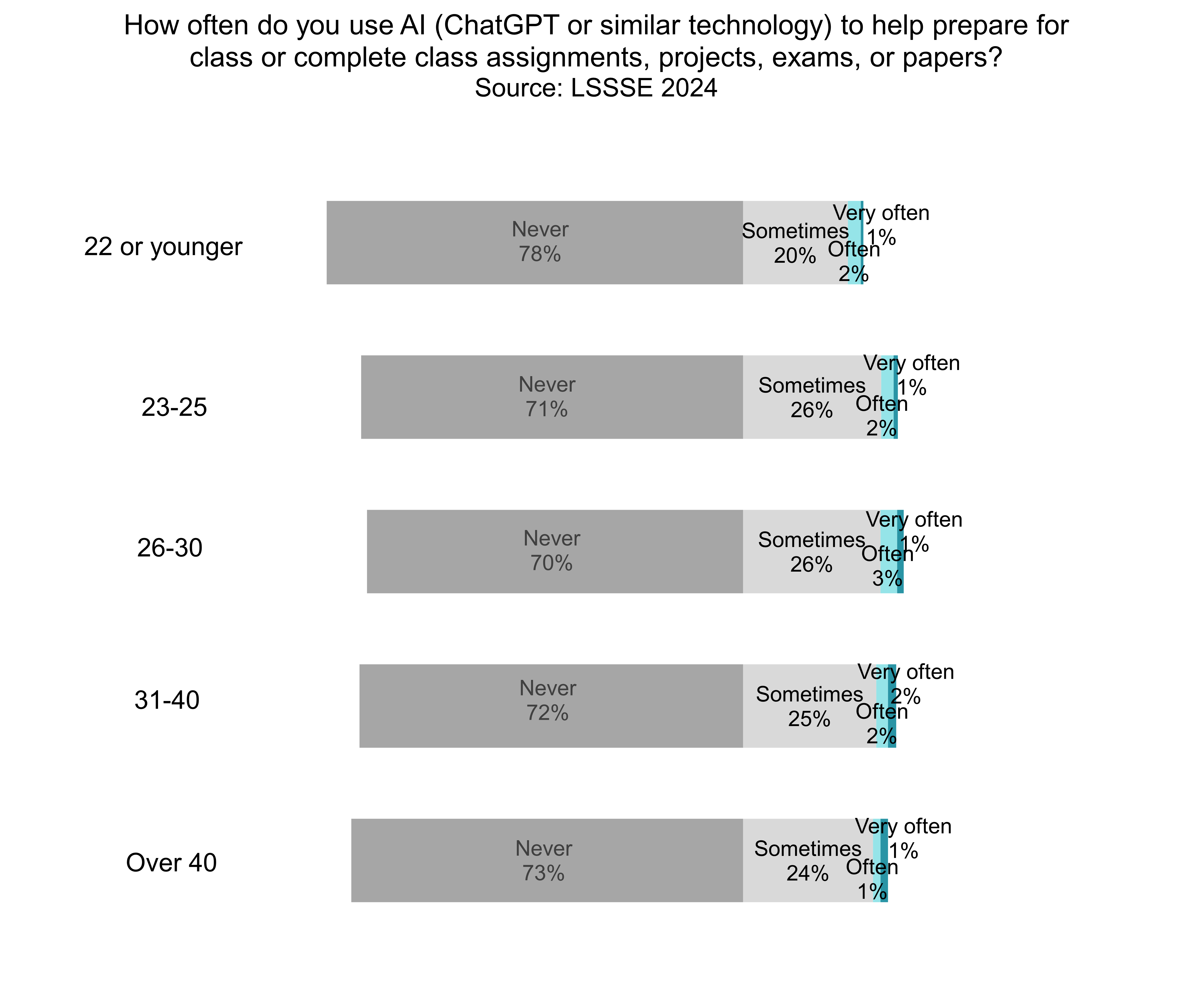
However, international law students are much more likely than domestic law students to use AI for their law school coursework. Almost half of international law students (48%) use AI at least sometimes compared to only 27% of domestic law students. This parallels a larger trend in undergraduate education in which U.S. college students are much less likely to use AI than their counterparts elsewhere in the world. International students attending U.S. law schools who speak English as a second language may be drawn to AI because of the ways it can be harnessed to support the unique needs of multilingual students, particularly in decoding complex texts. Whether AI usage for this or any other purpose is necessarily desirable remains to be seen, although it is useful to note that students are already accessing and using these tools.
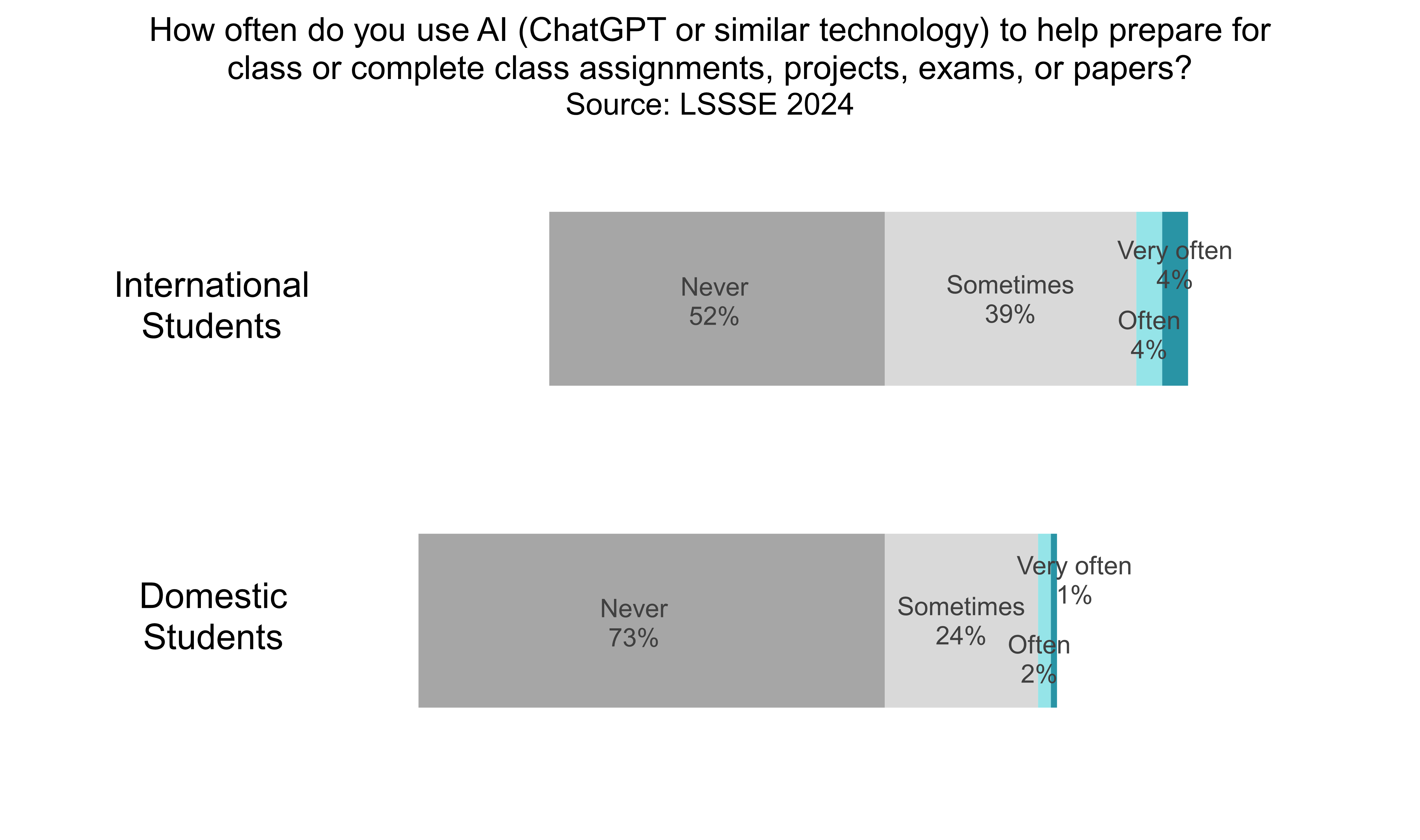
AI usage among law students in the U.S. is currently quite low, with most students never using it for their coursework. There are some variations by age and nationality, particularly with international law students using AI tools at a much higher rate than domestic law students. Law schools would be wise to pay attention to both the potential benefits of AI for legal research and writing, as well as the challenges and limitations of AI in the legal domain. LSSSE will continue to track AI usage to understand the degree to which law students are using these tools in their pursuit of learning and understanding the law.
Law Students Working Harder Than They Thought Possible
Faculty hold law students to high standards. In 2022, 60% of law students frequently worked harder than they thought possible to meet faculty members’ standards or expectations. This number has generally trended upward over the last twenty years, although the lowest recorded percentage of students frequently working harder than they thought possible was still a respectable slight majority (51%) in 2006. In 2022, only 8% of students never worked harder than they thought possible.

Somewhat unsurprisingly, students who are new to law school are more likely to push themselves to their limits than students who are accustomed to law school life. Two-thirds (66%) of 1L students frequently work harder than they thought possible compared to 54% of 3Ls and 49% of 4Ls. Perhaps new law students are particularly eager to prove themselves to their professors and peers or perhaps more senior students are accustomed to the way that the law school curriculum draws out their best performance and thus already know exactly how hard they can work.

Interestingly, students who generally achieve C grades in law school are more likely to frequently work harder than they thought possible compared to students who achieve mostly A’s and B’s. This may indicate that degree of effort is not always accurately reflected by scores on papers and exams for some students.

Finally, there are gender differences in the percentage of students who surprise themselves with the intensity of their efforts. Sixty-three percent of women frequently work harder than they thought possible to meet faculty standards or expectations compared to 56% of men. People with another gender identity fall in between at 60%. Ten percent of men and people with another gender identity never work harder than they thought possible compared to only 7% of women.

The data are clear that attending law school is a challenging and demanding endeavor. Most students rise to the occasion by pushing themselves to do their best work in order to meet faculty members’ standards or expectations. Hopefully these efforts are counterbalanced by supportive law schools who also foster good self-care and community care practices for budding legal professionals.
Providing the support law students need to succeed academically
A strong academic program is the foundation of any law school. Equally important is that law schools provide the support services students need to meet the rigors of the curriculum. About two-thirds of law students feel that their law school places “quite a bit” or “very much” emphasis on providing the support they need to succeed academically.
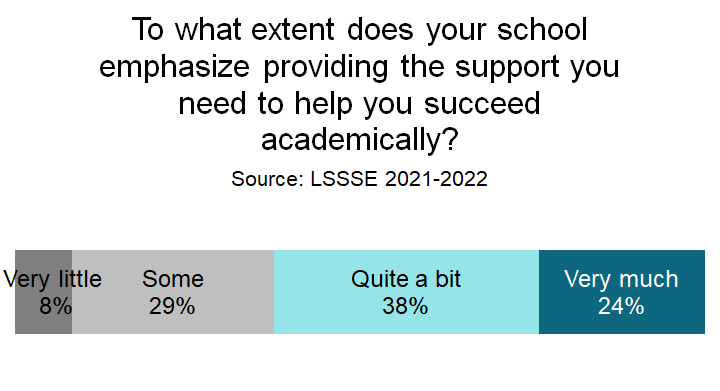
1L students are more likely to feel supported than their more advanced colleagues. Although the general optimism and positivity that 1L students feel toward their experience tends to steadily decline with advancing years for any measure of engagement, for the perception of academic support, satisfaction drops markedly among 2L students and then remains at that level during 3L and 4L years. This suggests that there is an initial sense of being supported that fades fairly quickly after students adjust to their new environment.

Two-thirds of men feel that their law schools places a strong emphasis on supporting academic success, which is slightly higher than the proportion of women who feel similarly (60%), but fewer than half of the people who have another gender identity feel that level of academic support.
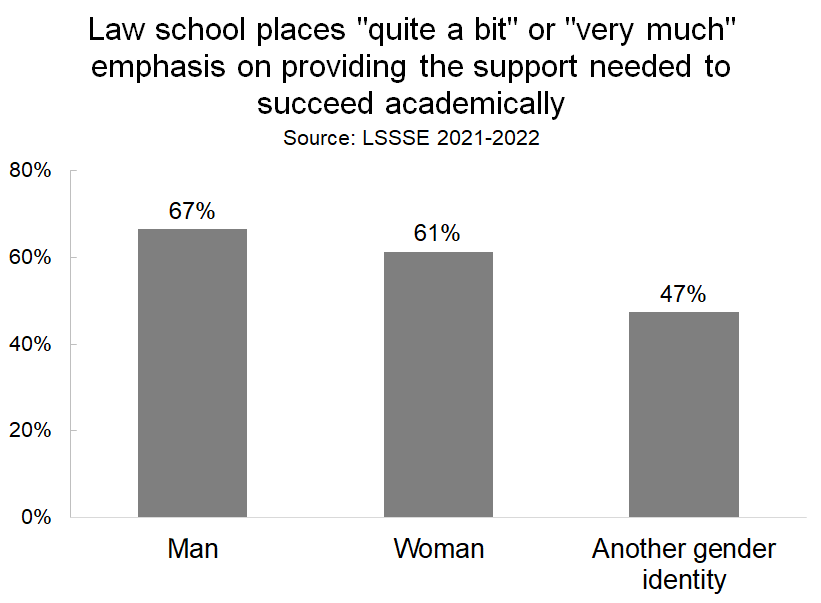
Importantly, the degree to which students feel academically supported is very strongly correlated with whether they are satisfied with their overall law school experience. A full 91% of students who rate their experience as “excellent” feel supported in their academic success compared to only 7% of students who have are having a “poor” experience.
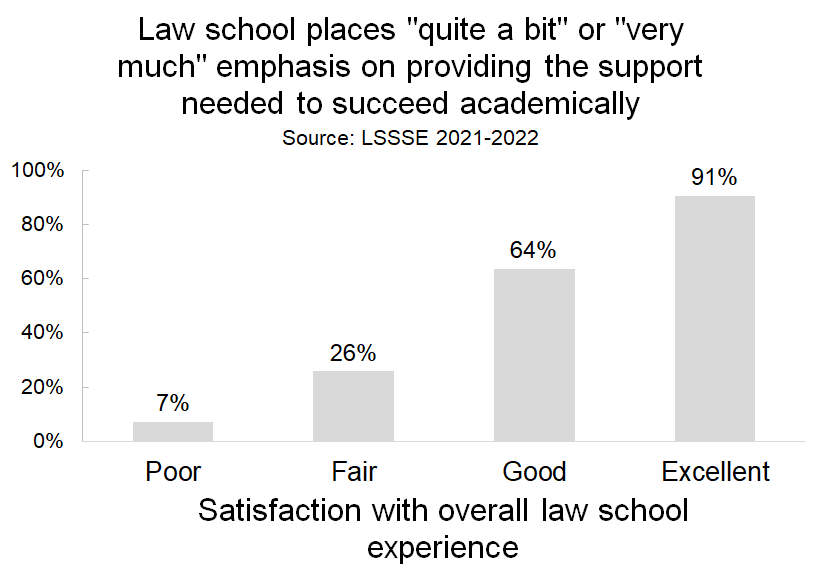
Perceived degree of academic support is also closely tied to whether a student would choose their law school again if they could start over, although the relationship is slightly less stark than for overall law school satisfaction. Among students who would either probably not or definitely not attend the same school, about 32% feel supported to succeed academically. But among students who would probably or definitely attend the same school, 70% feel academically supported.

Law students are driven to succeed in the face of the challenges presented by their academic program. Students who feel supported in their academic endeavors by their schools are more likely to be satisfied with their overall experience and to say that they would choose the same school if they could start over. Academic support is integral to a successful law school experience and likely impacts students’ long-term satisfaction and likelihood to become alumni who speak highly of their alma maters.



